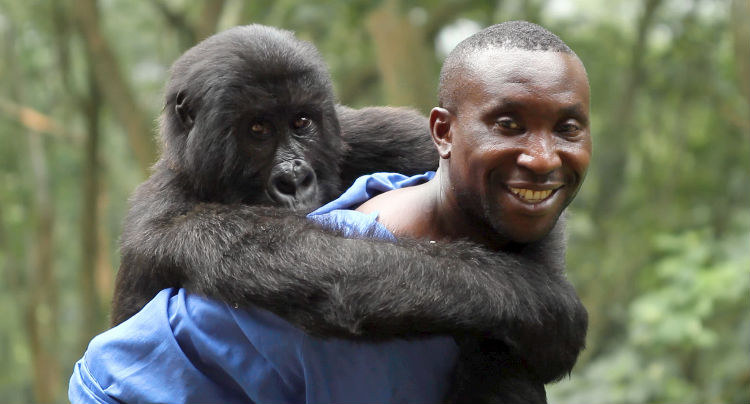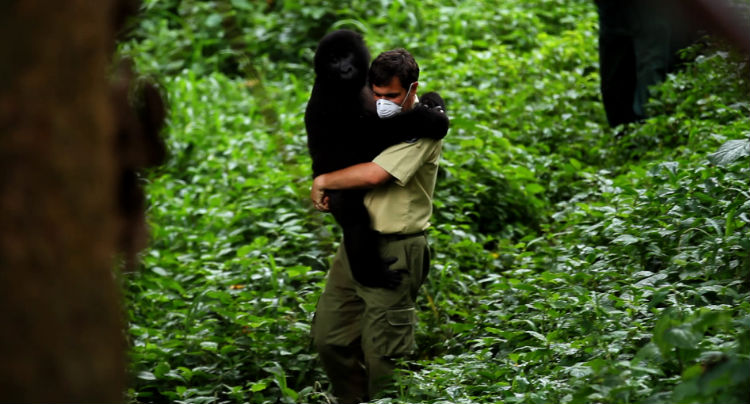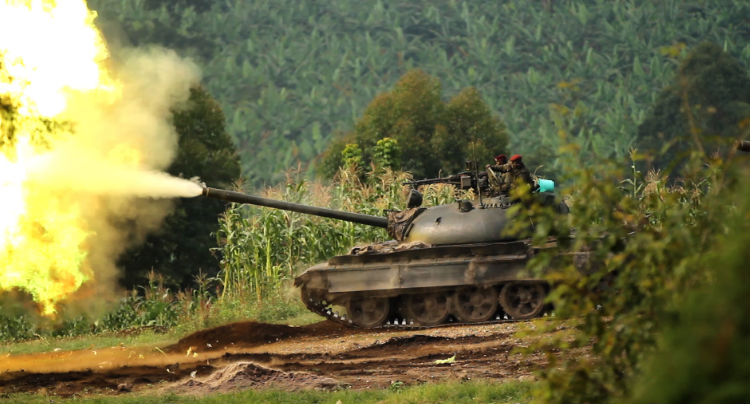Orlando von Einsiedel: Africa’s Oldest National Park Needs Your Help

Virunga is Africa’s oldest national park located in the Eastern Congo, a sprawling landscape that’s home to the endangered mountain gorilla, an animal that symbolizes hope for the troubled region in a time when civil war and outside parties threaten to destroy the integrity of the park. Orlando von Einsiedel’s intense documentary Virunga, which is streaming on Netflix today, chronicles the struggles the park’s protectors–intrepid park rangers and workers who lay their lives on the line daily–endure to make sure the gorillas are kept safe.
The outside threats are numerous: poachers dwindle the park’s diverse collection of wildlife; a war between the Congolese army and a rebel group rages; and the park’s biggest enemy, a British conglomerate called SOCO International, is using sneaky tactics (that Einsiedel documents in the film) in order to illegally exploit the park’s oil resources. The film follows a number of the park’s advocates and protectors, like Belgian park director Emmanuel de Merode and gorilla caretaker Andre Bauma. Einsiedel’s first feature is a stunning piece of vérité documentary filmmaking, but it more importantly hopes to serve a higher purpose of raising awareness about the dangers the park and its inhabitants face, acting as a signal to the world that this natural treasure needs our help.
In San Francisco we spoke with Orlando, Emmanuel, and Andre about war erupting during filming; the courage and character required to be a park protector; the incredible war footage Orlando captured; how the gorillas are the key to future economic prosperity in the region; the state of Virunga today; what we can do to help, and more.
For more information on how you can help Virunga, visit virungamovie.com

Like many documentaries, Virunga was a project long in the making. From what I understand, you had to be very flexible with your original vision of the film due to unforeseen circumstances.
Orlando: I was drawn to the park by its transformative power. There’s been 20 years of war in the Eastern Congo, and the narratives that come out of the region tend to be about conflict, sexual violence…these are really important stories. I was interested in telling a different story, a positive, uplifting story. I came across Virunga and the rangers risking their lives to protect gorillas and drive forward these really ambitious development projects to create jobs and stability and security. That’s what drew me, this sort of different narrative coming from the region.
I wrote Emmanuel and asked if I could make a film about him, and he didn’t reply. [laughs] Eventually he got sick of me asking and I came out to film the rangers. It was the story that I tried to make from the beginning, about these amazing people doing incredible work. I’d been on the ground for about a month, and there was a rebellion that quickly turned into a full-blown civil war. Around that same period I learned about the park’s very serious concerns about illegal oil exploration by a British company called SOCO International. That’s the point where the whole thing took a U-turn.
It became a very different production, I’m sure, when these new dangers arose. Did you have to do an emotional or mental 180 to prepare?
Orlando: As a documentary filmmaker you always have to be flexible. Every film changes to a degree; you can plan meticulously, and something will go wrong. Did I have any idea about how much flexibility I’d need? No. [laughs]
You found wonderful subjects to drive the film.
Orlando: It’s kind of funny to talk about them while they’re sitting here! [laughs]
Emmanuel: Be careful what you say…[laughs]
Orlando: To be completely honest, you’re really spoiled for choice of amazing people working in the park. I’ve had the good fortune to travel quite a lot for my work, and I often meet quite inspiring people, but I’ve never met anyone with as much integrity and honor as the rangers. While the film focuses on Andre , Rodrigue , Emmanuel and Melanie, there were loads of rangers who could have been in the film. They all represent that bravery and honor. 140 rangers died in the line of duty, protecting the park. Every day they wake up and know it could be their last. They do it because they know the potential the park has to transform the region. One of the things I came away with at the end of this is that, we all have things we care about, but the rangers are willing to pay the ultimate price for something they believe in. That’s really very humbling.
The segments focusing on Andre and the gorillas are breathtaking and give the film a nice shape, providing a respite from the heavier stories.
Orlando: It’s like that in real life. There was a period where most of the park’s staff had been evacuated, and I stayed. I remember going down with Emmanuel and we were with the gorillas. You could hear the bombs, but the gorillas were there farting and climbing all over…in real life, they are this amazing break of tension. The gorillas are amazing.
Andre, did the cameras bother the gorillas in their environment?
Andre: It was never really an issue for the gorillas. They got used to the filming really quickly, and it became a part of daily life. From a wider perspective, it was important to be able to share what the gorillas were like and the issues that were unfolding in Virunga to the rest of the world. That’s what was most important.
Orlando: The gorillas were very interested in the beginning in trying to eat the cameras. There’s a lot of footage of them trying to put the cameras in their mouths. When we started shooting, we had GoPros, and we have incredible footage of them stealing the cameras and running away into the woods and chewing them.
Talk about the importance of the gorillas to the region and the park and why people have such a passion for protecting them.
Emmanuel: The gorillas are very much at the center of the story, but they’re also very much tied into everybody’s lives in and around the park. They’re very much the centerpiece of the hope we have for the region in terms of developing the economy. Tourism could play an enormous role in relaunching the economy, and that’s the only longterm solution to resolving this terrible conflict the Eastern Congo has been going through. We have to create jobs, a dignified future for young men and women in the Eastern Congo to be able to rebuild their country. Tourism is right at the center of that. We feel this great affinity for the gorillas, but at the same time, there’s this incredible role they can play in rebuilding this part of the world that has suffered so much.
Andre: It’s really important to explain that the gorillas are at the center of everything we do in Virunga. They’re the reason why Virunga was created in the first place. They’re also at the center of a national park which has a larger number of species than any park in the world, more diversity of life than any park in the world. All of that is maintained and preserved because we’ve got those gorillas. They’re what brings people to Virunga, and that’s tied to the fact that there are organizations that come and initiate development around the park.
The war footage you captured for the climax of the film is unbelievable. Some intense stuff.
Orlando: Filming it was terrifying. But you always have to check yourself. While I was scared at times, I drew strength from the bravery of the rangers. They’ve lived through 20 years of this. Every time I’d get scared, someone would say, “Put yourself together, you chicken!” [laughs] The sad reality is that those things were happening while we were there, and similar things are happening on that side of the world.
Emmanuel, your composure in even the most heated moments of war seems to never waver. What does it take to muster up that courage?
Emmanuel: It’s what many officers feel when they’re in that situation. It’s partly what you prepare for, and it’s partly a response to the people around you. We were prepared properly, because war was always something that could have happened, and we’ve experienced it before. When you find yourself in that situation, you have to be prepared and know exactly what needs to be done, which is to give confidence to the people who depend on you for leadership in those situations. It was actually remarkably easy because I was surrounded by people who were giving me confidence and strength. There was no signal from them that they would abandon their position. [Their responsibility] was to keep hold of the park station in spite of the fact that there was a war going on. In some ways, you go a little bit into autopilot to do what you’ve prepared for.
The film will be released to the world on Netflix shortly. What are your highest hopes for Virunga?
Orlando: This film was always about more than just the film from the beginning. Very early on, together, as a team, we decided that the film could be used as a tool to protect Virunga. The way it can do that is by showing the world what’s going on in that park, mainly in relation to the illegal oil exploration by SOCO International. To release on Netflix to over 50 million homes in over 50 countries is an incredible opportunity to share with the world what’s happening. Protecting Virunga isn’t just about protecting the home of some of the world’s last mountain gorillas or the part of the Eastern Congo that has the key to driving forward sustainable economic development; it’s something everyone across the planet should be concerned about. Virunga is a world heritage site, and these are parts of the world that humanity has decided are so important that they should not be exploited for oil or coal or gas. If somewhere as iconic as Virunga falls in the face of business interests, where on our planet is safe from human greed? We’re excited to share Virunga’s story with the world, and we hope it will help protect it.

What can our readers do to help?
Orlando: There are four simple things we’re asking people to do. The first thing is to sign up at our website, virungamovie.com. There’s information on there, and we also send out newsletters every few weeks. The second thing is that we want people to spread the word about this film. We want as many people to see it as possible. People can spread the word on social media–Facebook, Twitter–and tell people it’s coming out on November 7th. The third thing is for people to donate directly to the park through virunga.org/donate. The last thing is that we want people to look at their shares. They probably aren’t invested in SOCO International, but they may well be invested in companies that invest in SOCO. In the US, some of the biggest companies, like Bank of America or Blackrock…if you invest in those companies, we ask that you write to them and say, “What are you doing to get this company to answer for the allegations presented in this film?”
What’s the state of Virunga right now?
Emmanuel: Virunga is an enormous park, about 2 million acres in size. I’m from Belgium myself, and it’s a 3rd the size of my country. Within the park, you’ve got an enormous amount of landscapes and species that live there. It’s suffered greatly over the years, over 20 years of civil war. Some of those species, like the hippos, have been decimated. There used to be 27,000 hippos; in 2005, there were less than 350 left. It’s one of the greatest traumas for wildlife population. Since then there have been signs of recovery, so there is definitely scope for hope, but it remains very, very vulnerable. A species that has done well are the mountain gorillas, who are incredibly vulnerable because there are so few of them. In the early ’90s, there were only about 350 left in the world. Today, there are over 800. They’ve made this remarkable recovery, but at an enormous cost, which is what the rangers have suffered to protect the gorillas. This is a team of Congolese rangers who’ve just stuck it out through these 20 years of violence and civil war to keep these gorillas safe. They’ve succeeded, and in effect created one of the greatest miracles of modern conservation, enabling these gorillas not just to survive, but to grow. It brings hope to a very difficult situation. It also has this other outcome, which we didn’t expect. Protecting and safeguarding these mountain gorillas is a universal objective. It’s brought communities together, particularly in our community of park rangers. We have people from all walks of life working toward this objective.
Andre: We can see the damage that’s been done to the park. The destruction of the forest, the poaching of animals. It’s incredibly important to us that this doesn’t go by unnoticed. While the rangers have done everything they can to protect the park, they’re not strong enough to confront the incredible pressures being exerted on them. Their story needs to be told so that people can become aware of that. The film has provided an incredible voice for those who work in the park and the rangers. There are these more complex issues to do with the destruction of the park and how that happens, tied to illegal use of natural sources. There are serious threats to the park that have to do with the law, and we have to make sure the law is respected. Because a lot of these pressures come from the outside, this is a message that has to spread widely. That’s what the film has enabled us to do.
How is the fight against SOCO International progressing?
Orlando: The film launched in April, and there was a lot of attention. Emmanuel got shot. There was a lot of media attention over the SOCO issue. That pressure built up to an apex in June, when two days before SOCO’s AGM meeting they made an announcement that they were going to stop their operations in the park. When we first heard that, we were like, wow! The work that everyone had been doing has worked! This billion dollar company has realized they’re being idiots and come to their senses. It was only about 12 hours later that we realized it wasn’t quite what it seemed. To cut a long story short, it doesn’t seem to be anything more than PR spin. They’re still in the region, they haven’t withdrawn unconditionally. Virunga isnt’ safe from SOCO. It’s the one big cloud that threatens the integrity of the park. We’ve called on them to answer for the allegations in the film. And it’s not just us: since the film launched, a number of people have continued the work. Several journalists [have helped], Human Rights Watch did two reports. SOCO has never adequately addressed those allegations. We want them to leave the park unconditionally.
Near the end of the film, we see some newborn baby gorillas. How are they doing?
Andre: The gorilla orphans are doing incredibly well at the moment, eating, playing all day. It’s a positive situation at the moment, so things are looking really good for them right now.
